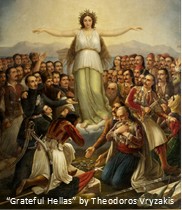1821: The Power of the Spirit
The year 2021 is the year of the Greek Nation. It is celebrated both in Greece, and in the heart of every person with a drop of Greek blood in their veins and is dedicated to the revolution of 1821. The revolution succeeded in throwing off the tyrannical occupation of the country by the Ottoman Turks. This freedom has been enjoyed for 200 years.
The Greek revolution was unlike any other before it or since. It was started by the people because of the unbearable suppression imposed by the Turks, which included: heavy taxes (head tax); forced conversion to Islam; banning of the national language and schools; being treated as second class citizens with few employment prospects and a hostile judicial system; the persecution and killing of people for their very deep Faith, thus becoming Christian Martyrs. These New Martyrs were reminiscent of the Martyrs of the early Church under the Romans.
The Greek people fought the Ottomans with inferior military equipment, but their morale was almost superhuman. They were fighting for their Orthodox Faith and the liberation of their country. Their motto was “Freedom or death!” Their banner was a white Flag with a blue cross across its length and breadth. Their leaders – Kolokotronis, Karaiskakis, Makriyiannis, Papaflessas, Kanaris, deacon Athanasios, and many more, dedicated themselves entirely to the revolution. They were all very religious, and their hearts belonged to God.
The achievements of the fighters were feats of valour and self-sacrifice. Many died, but the survivors saw about two-thirds of their country liberated. The objectives of all were realised: to save their Orthodox Faith; the Greek language; and, the Greekness of the Nation. The revolution was conceived and planned by the Greek intellectuals of the diaspora. Three people formed the Mastermind of the Friendly Society (Φιλική Εταιρία) effort: Skoufas; Xanthos; and, Tsakalof. At the local level, the fighters were supported both spiritually and materially by the majority of the clergy, by many Bishops, and with the blessings of the Patriarchs.
However, the honour of feeding spiritually, improving the education and stimulating the patriotism of the masses, belongs to a humble monk-priest, known as Kosmas the Aetolian (1714 – 1779). He was a monk on Mount Athos but, hearing of the suffering of the people, he could not find peace in his heart. He went and met the Ecumenical Patriarch and asked for a letter of commendation so that he could tour the country, preach, and offer confession and Holy Communion to the people. The Patriarch was impressed, blessed him, and gave him what he wanted.
Father Kosmas immediately began touring the country. He toured Macedonia, the Islands of the Aegean sea, the north of the country, Epiros and south Albania which earlier was part of Byzantium. He electrified the people by his preaching, telling them that their most important possession was their soul, and that they should remain close to God. He made them proud of their inheritance, and encouraged them to live as true Christians. Illiteracy was rife so he persuaded the wealthy to donate money for schools, and the women to sell their gold cosmetics for the same purpose. So that people could at least learn to read and write, he established 210 primary schools that had six grades, and 1,100 “lower” high schools with the first three grades. He insisted that the people should speak Greek, so that they can understand the language of our Church, and become people of God.
Father Kosmas was beheaded by the Turks in 1779 at the incitement of the Jews following the Christians changing their bazaar from Sunday to Saturday, being the holy day of the Jews. The Church honours him as Saint, Martyr, and for being equal to the Apostles in his missionary zeal.
The Revolution owes its success to the Spirit which empowers one’s Faith in God, and which strengthens the soul and turns the body into steel so it can fight against all odds, in order to make reality what one believes is their own and their right.
The faith of the Greek people, the gallantry of its fighters and their dedication to God and their ideals shone forth. It has been said that a country without a history cannot survive for long. Fortunately, the Greek Nation has a history going back at least 3000 years, replete with glorious periods and heroic events, such as the revolution of 1821.
Source: Lychnos December 2021 / January 2022

